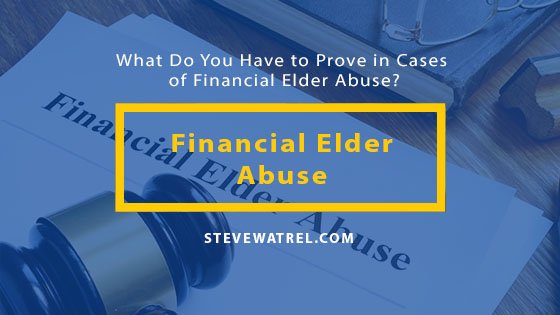Financial abuse of the elderly includes an array of behaviors from the theft of property to “borrowing” property from an elderly individual with the intention of keeping it because of the individual’s poor memory or lack of will or ability to retrieve it. It also occurs if you someone uses undue coercion or influence to convince an elderly person to change their will or hand over property.
There are many people who are capable of committing financial elder abuse, including friends, family members, and even service providers, such as nursing home employees, caretakers, attorneys, and accountants. Even strangers may befriend an elderly person to try and gain access to their property.
In the state of Florida, anyone who is in a position of confidence or trust to an elderly person is expected to put the elder person’s needs first and not to use or obtain the assets belonging to the elder for their own or someone else’s purposes. In order to prove financial elder abuse, you must provide evidence that the caretaker is manipulating/taking advantage of the elderly person for financial gain. The potential legal consequences of violating the elder exploitation laws in Florida are severe and may include attorney’s fees, triple damages, and punitive damages.
What is Elderly Fiduciary Abuse?
If an elderly person’s faculties begin to decline to a point where they aren’t capable of making important decisions regarding their finances and health, people they trust may be given the legal powers to begin making decisions for them. This is usually done through a power of attorney or guardianship.
Both a guardianship and power of attorney create what is referred to as a fiduciary relationship. It exists between the person who is entrusted with decision making for the senior and the senior themselves. The individual given executive power over the senior’s affairs is referred as the fiduciary.
The Fiduciary is held to very high standards of care because of the possibility they may abuse their authority. It’s necessary for a fiduciary to always put the best interests of the elderly individual first. There are often strong consequences for a fiduciary who abuses their power and puts their own interests over that of the elderly person who is under their care.
How to Prove Breach of Fiduciary Duty
According to the elder exploitation laws in the state of Florida, any breach of fiduciary duty takes place if the guardian or agent isn’t acting in the best interests of the elderly individual. To prove there was a breach by the fiduciary or someone else, one or more of the following must be proven:
- Extensive withdrawal from monetary accounts
- Increased or changed spending habits
- Someone added to the senior’s financial accounts
- Unpaid health care costs or no health care
- Changes in the senior’s estate
- Changes in the senior’s personality
- Payments or gifts that seem excessive
If you believe that your loved one has been the victim of financial abuse in any way, contacting an attorney for help is the best thing you can do. Steve Watrel has has over 30 years of experience handling nursing home abuse and can effectively gather the needed evidence for the case to ensure the responsible parties are punished. Contact us today for a consultation.




